The domestic expression of imperialism has once again been made clear with the installation of a new cobalt refinery in an Oklahoma town. Through the extraction of raw materials from the global south using exploited labor, a U.S. corporation continues the practice of contaminating the environment to reap profits at the expense of Africans and other working class people domestically.
LAWTON, OK — Much is revealed by a name. Such is the case for the small town of Lawton, Oklahoma. A regular U.S. town, 80 miles southwest of Oklahoma City, populated by some 90,000 people living in the shadow of a pair of curious parasitic anomalies.
In Lawton, there is a road that runs through town from East to West. On one side of the road are apartment buildings, public storage facilities, a barbershop, and the other usual edifices of a small American town. On the other side of the street lurks something far more sinister: Fort Sill Military base, an enormous 94,000 acre facility built on the lands of the Kiowa, Apache, Comanche and Wichita Tribes. The base, part of which is built on a Comanche sacred cultural site, looms over the small town of Lawton like an enormous parasite, drawing in labor to serve the various apparatuses of its violent industry, and returning little aside from spent ammunition and some of the highest levels of PFAS groundwater contamination in the country.
Lawton’s most prominent feature, however, is not its most significant. In December 2022, Lawton’s City Council introduced a mysterious and unexplained ordinance allocating $574,000 of public tax dollars to the “Blue Braveheart Project”. This ordinance was passed without explanation or input from Lawton residents. It was later revealed that this project was a result of a coordinated effort between members of the Lawton’s City Council and a private entity known as Westwin Elements.
Westwin, like Lawton, is revealed in its true nature by its name. The company was founded in 2022 as a result of some keen, but much overdue observations of right-wing state actors and capitalist opportunists within the failing U.S. empire. Westwin, according to its founder, Kaleigh Long, began with the intention of opening the United State’s first cobalt refinery in Oklahoma. This facility would allow for the refining of raw cobalt deposits (referred to in the industry as “feedstock”) into refined cobalt, which is increasingly used in the manufacture of rechargeable batteries used in electric vehicles, portable electronic devices, and the various tools of the U.S. war machine.
“The United States’ first cobalt refinery being built in Lawton has brought this global imperialist project to our doorstep,” said Xavier Shakur, a Lawton resident and organizer with the All-African People’s Revolutionary Party. “We have an opportunity as a community to be on the forefront of the resistance to US imperialism.”
Westwin’s Long specifically cited the importance of cobalt in weapons manufacturing as one of her reasons for getting involved in the business. In an interview with KWSO, she highlighted delays in production of F-35 fighter jets that resulted from cobalt shortages as a motivation for improving the U.S.’s cobalt refining capacity.
Long was formally educated at the Institute of World Politics, where she studied U.S. national security interests in the Democratic Republic of the Congo (DRC). Before Westwin, she had a career as a political operative in the global South, involving herself in a variety of imperialist ventures in Haiti, Venezuela, South Africa, and the DRC.
As Westwin’s founder, Long’s close ties to right-wing political operatives and intelligence operations have proven quite useful in elevating the prospects of her new business. In September 2022, Florida Representative Byron Donalds and other members of congress wrote a letter to the Department of Energy (DOE) and the Department of Defense (DOD), insisting on the urgency of developing a strategy for domestic cobalt refining. The letter correctly observed that the absence of such facilities and the U.S.’s total reliance on foreign imports of refined cobalt presented serious strategic vulnerabilities. That most of the world’s cobalt is mined and refined by Chinese companies was of increasing concern for the authors, particularly as the U.S. escalates hostilities in the South China Sea in an effort to counter the advance of multipolarity and the inevitable demise of the west’s so-called full-spectrum dominance. The congress members encouraged the creation of incentives to develop private industry to refine cobalt, and in the footnotes specifically identified Westwin as one promising candidate.
The conclusions of this letter, which were echoed by a U.S. Geological Survey report, were also reflected in a white house statement released earlier that year. In February, the white house invoked the Defense Production Act, stating that the DOE, DOD, and the Department of State had “signed a memorandum to coordinate refining and stockpiling of cobalt to support the U.S. transition to clean energy and national security needs.” By invoking the DPA, the DOD is now able to allocate public tax dollars toward developing Westwin facilities and mandate that Westwin fulfills government contracts for refined cobalt. In doing so, they hope to stimulate domestic production of refined cobalt and resupply the National Defense Stockpile, which has dropped from 13,000 tons to an estimated 333 tons since the end of the Cold War.
This favorable political environment has enabled Long to raise $50 million for her refinery and open a small demonstration plant in Lawton. If the demonstration plant proves to be an operational and financial success, it is likely the project’s funders would commit the capital to build a full-scale refining facility in Lawton. This would take Long’s small-time imperialist science fair project to new heights allowing them to produce 20,000 tons of cobalt annually, an amount they claim would meet half of the U.S.’s annual demand for car batteries.
“The plant is already here, and it'll be set in motion once the Governor of Oklahoma, Kevin Stitt, gives Westwin a letter of approval,” said Josh Isaac, a Lawton resident and organizer with the Black Alliance for Peace. “If the demonstration plant fulfills the necessary criteria made by the City of Lawton, they'll be well on their way to building the full scale refinery by 2026.”
The facility would require significant inputs of cobalt feedstock, the likes of which are not available in the U.S. The DRC on the other hand produces on average around 70% of the world’s cobalt and retains about 50% of the global reserves. Any realistic, profitable strategy for acquiring cobalt feedstock would require establishing a relationship with the DRC and/or negotiating deals with the companies running the mining operations there.
However, most of these mining operations are majority controlled by Chinese companies. In 2021, an anonymous senior member of the DRC government claimed that “in eighty-five percent of the major mining contracts you will always find a Chinese company behind the deal.”
The Chinese companies have no reason to negotiate or relinquish control of these facilities to U.S. businesses. As Westwin’s leadership has similarly realized, selling refined cobalt products is far more profitable than selling feedstock. And since China controls both the refineries and the cobalt mines to supply them, Westwin’s leadership is faced with a significant barrier.
As a result of their present inability to overcome this obstacle and effectively counter China’s influence in the region, the U.S. federal government has been forced to turn elsewhere, attempting to strengthen its relationship with the Indonesian government (another country with significant cobalt production capacity). However, President Joko Widodo has insisted on a position of neutrality in the increasing tensions between the U.S. and China, and has been publicly critical of the U.S.’s role in funding, arming and providing diplomatic cover for Israel’s genocide in Palestine.
Long, for her part, was seemingly not unaware of these barriers. Prior to founding Westwin, Long had a history of working with and promoting the candidacy of Félix-Antoine Tshisekedi, who had publicly raised concerns about the DRC’s mining contracts with China and indicated his preference for aligning with the U.S. Following his rise to power, Tshisekedi announced in 2021 that he would renegotiate contracts with Chinese mining companies that were signed under former President Joseph Kabila. These contracts have since been renegotiated and reduced in scale, but not abandoned as the U.S. and Westwin had certainly hoped.
So long as the government in the DRC remains partial to its relationship and contracts with the Chinese government, the U.S. will have to rely on China to meet its significant appetite for cobalt. As the U.S. continues to escalate tensions with China, it is likely U.S. imperialist operatives will attempt to deploy a number of strategies to shift the balance of power in the DRC. In fact, there has already been a coup attempt in the country this year led by former U.S. military officer Christian Malanga and three other U.S. citizens. While the poorly executed nature of this attempt have led some to doubt the U.S. government’s involvement, this could simply be another reflection of the failing empire and its capacity to execute special and covert operations.
Continued instability and the perpetuation of the decades-long genocide of over 12 million Congolese in the DRC by the Rwandan and Ugandan governments and M23 militias since 1993 continues to be the result of U.S. neocolonial maneuvering in the region. The significant material support these anti-human actors receive both directly and indirectly from the U.S. government, will continue to be a part of their strategy to shift the balance of power in the region. With little means of acquiring the desired volume of cobalt without involving China, the U.S. government will continue to treat the Congolese people as necessary sacrifices on the altar of capitalism and the military industrial complex. In order for the profits of companies like Apple, Google, Tesla and Microsoft to be maintained, death and devastation will continue to be the order of the day in the Congo.
Organizers in Oklahoma have recognized the significant threat that Westwin’s new refinery in Lawton poses to Africans on the continent and in the U.S. With the demonstration plant already established, organizers are keenly aware of the urgency of organizing against Westwin.
“We've talked about the implications of this refinery, and the danger it poses to people of Lawton and Congo, in our past political education events,” Josh said in reference to their October teach-in. “The City of Lawton already has numerous problems like any other city in this capitalist society, but the pollution that'll come from this plant is dangerous. And could lead into a situation like the explosion in the Biochemical Lab in Conyers, GA, or the ghost town of Picher, Oklahoma.”
Xavier echoed these concerns and the need to organize against Westwin, saying “as members of the Black Alliance for Peace and All African People’s Revolutionary Party we’ve begun hosting teach-in events to raise awareness about the refinery and its implications for not only the citizens of Lawton but also the citizens of the DRC. Our struggles against imperialism are now intertwined. God willing we will all be victorious.”
There is little question for residents of Lawton that Westwin has any interest in the well-being of the people or the indigenous lands their refinery is built on. The need to organize against it is clear, both for the sake of the community in Lawton and for the Congolese people whose struggle theirs is closely tied to.
The small community of Lawton has been met with the full force of the imperialist machine, but the will of the people will always outweigh that of the state and capitalists. As Africans, the end of Westwin is the duty of all us, for the sake of a free Congo and its people who have endured long enough.
Kodjovi Kpachavi is an organizer with the Black Alliance for Peace and the All-African People’s Revolutionary Party, a journalist, artist, and researcher. His work focuses on people’s struggles in Africa and in the diaspora.

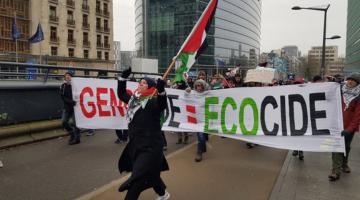
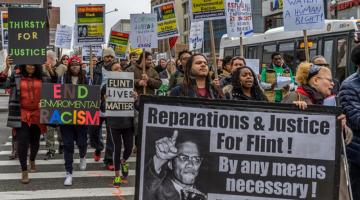
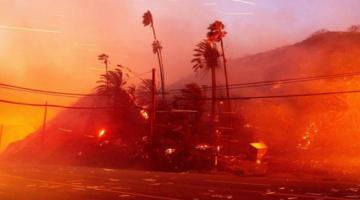

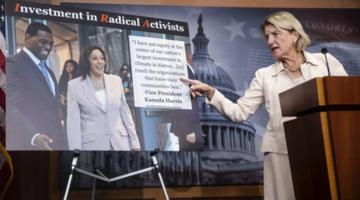
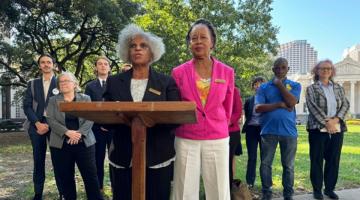

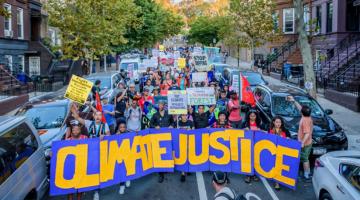
![How Joe Biden and The Democratic Party’s Climate Agenda Increases Environmental Racism More Than It Reduces Emissions [A Three Part Series]](/sites/default/files/styles/nc_thumb/public/2023-09/cancer%20alley%20protest.jpg.jpeg?itok=kOK48inx)









